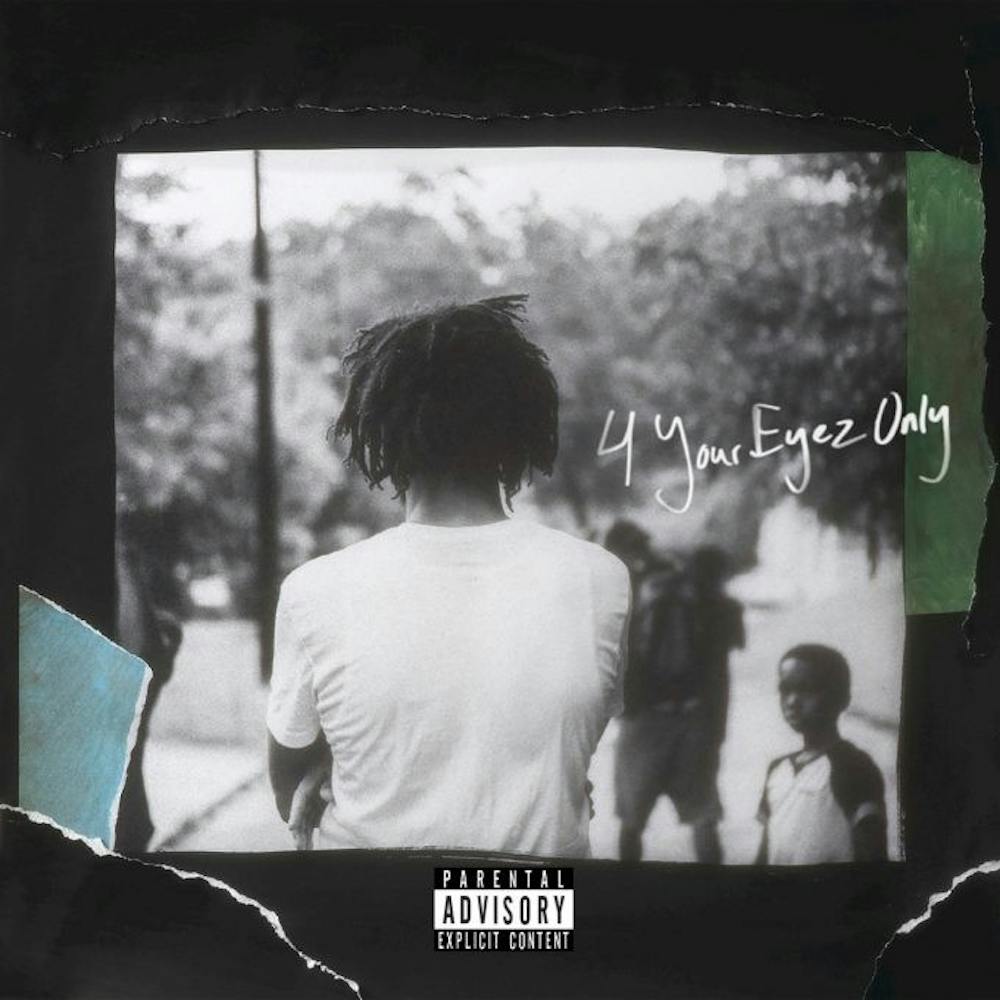“Double platinum with no features” is a mantra many loyal followers of Jermaine Cole have repeated when boasting on behalf of the rapper and his critically-acclaimed third studio album “2014 Forest Hills Drive.” The album precipitated Cole’s meteoric ascent to hip-hop’s A-list, but, in the two years since then, the North Carolina MC has quietly faded from the public spotlight.
In early December, though, Cole made headlines with the spontaneous release of two songs noteworthy for their aggressive critiques of other major rappers, including Cole’s former idol Kanye West. Riding the buzz generated from these songs, “4 Your Eyez Only” was issued a few days later, marking the rapper’s long awaited return to the rap scene.
In the album, Cole harnesses his exquisite storytelling talent to recount the incredible and heartbreaking life of one of his best friends. Each song displays a clear progression of character development throughout different stages of his friend’s life.
As the record progresses, Cole’s friend matures. In “Deja Vu” and “She’s Mine, Pt. 1,” he falls deeply in love, so much that he decides to give up his criminal lifestyle in “Ville Mentality” and “Change.” The latter half of the album follows the friend settling down with his wife and having a daughter, before his past finally catches up with him and he is tragically killed.
It is not until the final verse of the final song, though, that it becomes clear the album is written from the perspective of this late friend — until the last moment, it seems as though Cole is tracing his own life. Rather than claim the spotlight for himself, however, Cole uses it to celebrate his friend’s life and the love he had for his family. In fact, “4 Your Eyez Only” is addressed to his daughter and paints a vivid picture of how brave and strong her deceased father was.
Anchored by impressive lyricism and his signature storytelling chops, Cole fantastically succeeds in building the multifaceted persona of his late companion. Listeners envision a man who was tough but nuanced, pragmatic but loving and endlessly optimistic for a better life for himself and his daughter.
Cole has repeatedly cited old school hip-hop artists such as Tupac and Biggie as some of his strongest influences, and their mark on this record is crystal clear. The word “Eyez” in the title is stylized as an homage to Tupac’s classic “All Eyez on Me.” In addition, pervasive themes in the album include gang life and questions of mortality, topics not uncommon two decades ago.
The album’s holistic focus on storytelling and lyricism comes at the expense of production and music making. Beats are generally reserved and minimalist, a move which serves to instead shine the spotlight on the story of his late friend. As a result, the album still lags into painfully monotonous stretches — gone are the jams which characterized his earlier career, such as “Power Trip” or “No Role Modelz.”
Even though Cole has no features which have been a selling point during his rise, the presence of a few sharp contemporaries could have spiced up this particular album. Instead, Cole again opted for a solo project, monologuing his way through the story. Rather than make a full-blown studio album, he probably could have made an extended soliloquy to a similar effect — although it certainly would not have brought his friend’s story to as many listeners.
Indeed, the album is unstimulating at times that a Hampton Inn location tweeted this rather hilarious marketing ploy: “Is the new J. Cole album putting you to sleep early? Stop on by and stay the night with us at the Hampton Inn Sandy!”
Cole, however, didn’t intend to create aux cord music. He intended to bring his late friend to life and pass on his legacy. Through crisp, emotional storytelling and clever lyricism, he accomplishes just that, paying homage to his old school idols in the process. With “4 Your Eyez Only,” Cole brings listeners along for a journey — perhaps not the most exciting one, but a journey undeniably characteristic of the human experience.





